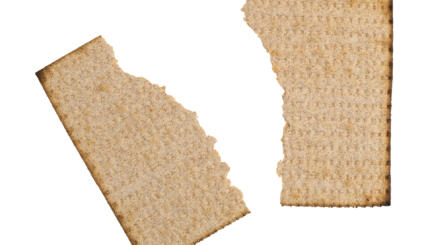The start of Passover is preceded by a host of rituals that typically begin a full 24 hours before the traditional meal starts. The night before the seder, a final search for leavened products is conducted by candlelight, the products of which are then burned the following morning. Many people also sell any leavened products that remain in their possession prior to the holiday, a transaction that Jewish law requires be completed by late morning on the day of the seder. And there is a custom for first-born men to fast from sunrise to sunset on the eve of Passover in commemoration of the plague of the first born, which killed all first-born Egyptians but spared first-born Israelites.
All of this is complicated when Passover begins on a Saturday night making the day that precedes Passover Shabbat, a day with multiple work prohibitions. The previous evening’s hametz search cannot be conducted as normally scheduled because fires are traditionally not kindled on Shabbat. Ditto the burning of the remaining hametz in the morning. Selling hametz is a business transaction, and so is also forbidden on Shabbat. And fasting is almost always prohibited on Shabbat. Consequently, in years when Passover begins on a Saturday night, a number of special accommodations must be made.
Getting Rid of Hametz Before Shabbat
When Passover begins on a Saturday night, the searching, burning and selling of hametz must be completed prior to the start of Shabbat on Friday night. The final search, known as bedikat hametz, which is typically performed the evening before Passover, is done two nights before, on Thursday evening. Whatever is found is burned on Friday morning, a ritual known as biur hametz. In addition, all the house cleaning and kitchen preparations must also be completed prior to Shabbat, as any cleaning or rendering kitchen utensils fit for use on Passover is forbidden on Shabbat.
Finally, the selling of any remaining hametz in one’s possession must be completed before Shabbat, since buying and selling are forbidden activities on Shabbat. However, many people will structure the transaction so that while signed before Shabbat, it only takes effect sometime on Saturday morning.

Help us keep Jewish knowledge accessible to millions of people around the world.
Your donation to My Jewish Learning fuels endless journeys of Jewish discovery. With your help, My Jewish Learning can continue to provide nonstop opportunities for learning, connection and growth.
Eating Challah on Shabbat
When Passover begins on a Saturday night, the meals served on Shabbat must be kosher for Passover. Even though it’s technically permitted to eat leavened products until mid-morning on Saturday, the process of readying the kitchen for Passover and ridding the house of leaven has already been completed on Friday. However, many Jews consider it religiously required to make the blessing over bread at two of the three meals traditionally eaten on Shabbat.
There are two basic approaches to handling this issue. One is to eat a small amount of bread using disposable plates, taking extra care to ensure that no crumbs fall on the table or floor. Any utensils used should be disposed of and any crumbs flushed down the toilet. All of this should be completed by about mid-morning. Many synagogues will hold services early that morning to enable the eating of bread before the cut-off time.
A second option is to use egg matzah that is certified kosher for Passover. Some Jews have a custom of avoiding matzah prior to Passover so that one consumes matzah for the first time each year at the seder itself. But egg matzah, because it is not made solely from flour and water, cannot be used as seder matzah and thus doesn’t run afoul of that custom.
The Fast of the Firstborn
Typically, this fast is observed on the day before Passover. But when the day before Passover is Shabbat, this isn’t possible, since fasting is not permitted on Shabbat. It’s also not observed on Friday, because fasting on the eve of Shabbat is also not done to avoid entering Shabbat in a state of discomfort. As a result, when Passover begins on Saturday night, the fast is held on the prior Thursday.
Havdalah on Saturday Night
As is always the case when a Jewish festival begins on a Saturday night, Havdalah, the ceremony that marks the conclusion of Shabbat, is integrated into the kiddush recited at the beginning of the Passover meal. The Passover candles serve as the Havdalah candle, enabling the recitation of the blessing over the flame. But the blessing over spices is eliminated. Finally, the concluding blessing of Havdalah is modified. Instead of blessing God who distinguishes bein kodesh l’chol (“between holy and secular”), the blessing says bein kodesh l’kodesh (“between holy and holy”).



